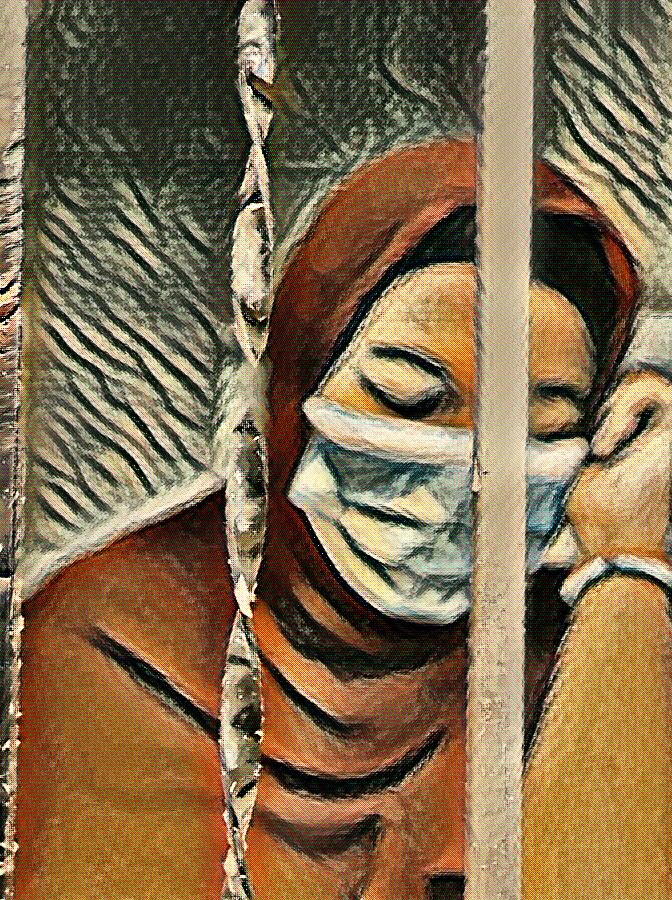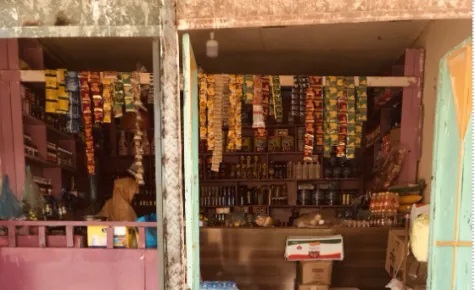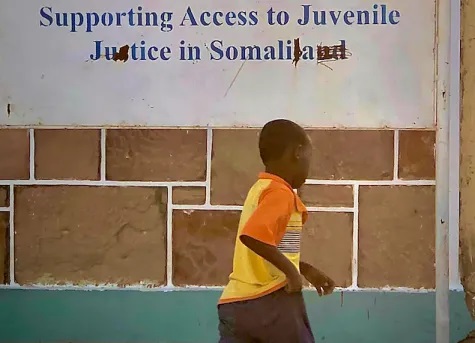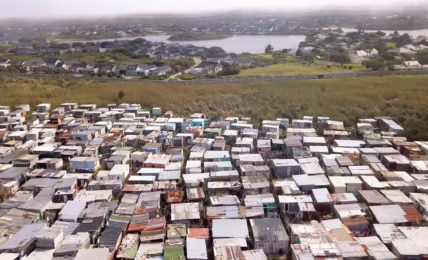Young Love Puts Girl Behind Bars: Somaliland’s Juvenile Justice System
Mona Liban meets the children who are being locked up while government officials take their time trying to update Somaliland’s youth detention system.

Mona Liban meets the children who are being locked up while government officials take their time trying to update Somaliland’s youth detention system.

There’s a quiet tension in the courtroom. Four cases are waiting to be heard and, after 45 minutes, neither the judge or the prosecution are anywhere in sight. Of three lawyers scheduled for hearings, only one is present.
Five male prisoners are huddled on the front bench, chained together at the wrists so that when one moves a limb, the others must shift to accommodate. Their ages range between mid-teens to mid-30s. Behind them sits a group of elders, all male, each dressed in a buttoned-up qamis, a long tunic that stops just above the ankles,and white traditional headdress. Representatives of their detained kin.
On the other side of the room, a girl of about 14 sits alone. She looks down at her feet and, from time to time, ritualistically unwraps and wraps her scarf around her small face. At one point, she gets up and walks over to where the detainees are seated. As he sees her approach, a young man in torn black T-shirt and grey sweatpants breaks into a cautious smile. He looks about 15. She kneels in front of him, and they begin to talk in hurried whispers.
No sooner have they exchanged a few sentences before a police officer standing at the back of the room begins to yell for the young girl to return to her seat.
“We’re only talking,” she tells him.
“Noqo Imika! Go back this minute!” his voice booms through the room.
“I’m not doing anything wrong,” the girl screams back.
The commotion that follows is sudden and jarring. The policeman moves swiftly from the back to the front of the room, seemingly in two or three strides. He stands over the girl who is now visibly shaking. Too suddenly for it to register, he slaps her hard across the cheek. She falls silent and a murmur moves across the courtroom. The young boy who she had been speaking to lets out a feeble objection, his face looks pained.
One of the elders mutters to the officer that he “shouldn’t hit one so young”.
The girl is in tears now. As the only other female in the room, I feel myself compelled to take her by the arm and lead her outside. By the time we reach the door, she is crying hysterically and railing against the officer between gulps.
“He’s been at me all day!” she almost screams the words, holding back just enough. I try to calm her down and move her further away from the area.
She tells me her name is Subeida and she is a new bride, having eloped with the young man in the black t-shirt and grey sweatpants. She tells me she’s 13 and, because of her age and the fact she isn’t cuffed or followed by a guard, I’m surprised to learn that she is actually in custody. The officer, the one who had struck her in a courtroom full of people, is her guardian, escorting her from a police station jail cell to the courtroom and back.
For the past month, Subeida has been held at the Daloodo Police Station at the request of her parents who disapprove of her marriage. Their objection to the union has less to do with her age and more to do with the fact that her husband is from a minority tribe, the Gabooye. According to the latest Freedom House report, members of the Gabooye tribe already “face discrimination, limited access to public services, and prejudice in the justice system”.
It also isn’t uncommon for parents to turn to the criminal justice system to punish unruly or disobedient children. In fact, according to a high-ranking official at the Ministry of Justice who agreed to speak to me on the condition of anonymity, “disobeying a parent is the most common reason children are jailed,” she says. “In Somaliland, you can lose your freedom in a blink.”
How the system deals with children
Since breaking away from Somalia and declaring its independence some 30 years ago, Somaliland has overcome a legacy of conflict and civil war. It has secured peace and been called a “pocket of stability” in a volatile region. But Somalilanders, who in the past had been acquiescent for the sake of peace, now seem to want more from their institutions, their government and traditional leaders. Peace is no longer enough. Pride in a shared national identity is no longer sufficient. Citizens want to see their systems reflect present times by way of civil liberty, law reform and a fair judiciary.
One place where this breakdown in the judicial system is more apparent than any other is in the handling and treatment of children who come into conflict with the law.
According to recent reports by Horizon Institute – an NGO specialising in the research and representation of juvenile justice – children detained before and during trial are exposed “to the very real danger of being ill-treated and, when locked up with adults as they are in Somaliland, of being corrupted by adults who have committed serious crimes”.
Hamdi Mohamoud Kalif is a legal officer at Horizon Institute in Somaliland and has represented dozens of cases on behalf of the organisation. “The biggest misconception in our society is that imprisoning children serves as a deterrent and is a way for them to correct course,” he tells me. “But the truth is, this country’s jails and prisons are no place for a child.”
Horizon Institute released the first of its five-part report series, A Collective Failure: How Somaliland’s Criminal Justice System Harms Children, in August 2020 with the fifth and final part published in March 2021. The reports detail the incarceration of convicted children in “overcrowded prisons alongside adults without (offering) educational or vocational training opportunities, sports, or counselling” at these facilities.
When I tell Hamdi about the courtroom scene and the 13-year-old detained and assaulted whilst in custody, he doesn’t seem surprised.
“The issue is that, as required by the juvenile justice law, detention and imprisonment are not treated as a last resort for children in Somaliland,” he sounds resigned. “The systems should only be looking at what is in the best interest of the child. We have laws that protect children but, simply, they are not implemented.”
The law that could change things
According to Human Rights Watch, Somaliland’s Juvenile Justice Law 2007 came into force in April 2008 with the primary aim being to “bring Somaliland’s juvenile justice system in line with both international norms and local values”. Critical provisions in the law protect children from detention and imprisonment with adults, and provides safeguards to avoid long-term sentencing for petty crimes and incarceration without due process. More importantly, the law also requires that a child only be deprived of their liberty as a last resort (when diversion options are exhausted), and only for the minimum time possible.
Advocates say that, in the past 12 years, very little effort has been made by the key players in government to implement this law.
Hamdi Mohamoud argues that these divisions and departments largely ignore their respective responsibilities under the law.
“We have provided all the essential government departments a copy of our reports,” he says. “Since August to now, we have given them to The Ministry of Justice, the Chief Justice, Ministry of Social Affairs and Labour and the Attorney General’s Office. Until now, we have not heard back from any of them.”
Improvements are ‘in the works’
At end of a large, boardroom table at the Ministry of Justice (MoJ), sits the new Minister, Saleebaan Warsame Guuleed, sworn in only weeks before.
“There are many challenges before us,” he tells me. “But we are determined to improve justice not only for young people but all Somalilanders.”
When I ask ‘how’ he will do this, the Minister, true to Somali form, answers with a proverb: “Sometimes the choices are only two: bad for me and worse for me”. He waits for me to confirm I’ve understood. I nod and he continues. “We don’t want to lock up our children. Of course not. But the danger some families face is very real. When on the street, a young girl has a knife to her throat, her safety in the hands of a 14-year-old boy demanding a phone, that is very real. So, what do we do?”
Yes, but what about the provisions under the Act that allow for rehabilitation, for diversion?
“Diversion and rehabilitation are critical,” he says. “And we are looking to create a physical space for dhaqan celis”.
Dhaqan Celis is a common Somali term and literally means a ‘return to culture’. It refers to activities or endeavours designed to reintroduce traditional values and behaviours into children and young adults who, in the eyes of the community, have gone astray.
“What form dhaqan celis will take, we’re not sure yet but we are looking at a facility which will be established soon. It will allow for such rehabilitation,” Saleebaan says. This facility has been required under the law since 2008 and, in 2018, the then Minister of Justice laid the groundwork to establish one near the port-town of Berbera. Since then, it has been “in-the-works”.
In almost all my conversations with Saleebaan, and later the Director-General and other officials working in the justice system, I am told the implementation of the Juvenile Justice Law 2007 is either “in-the-works” or “in-discussion” but never “in-action”.
The harm done: a teen’s time behind bars
I’m standing in a tiny shop atop the hills of Boqol Jire. Behind the counter is one of Somaliland’s thousands of small-scale female entrepreneurs, Anab. Wearing a long, burnt-orange jilbab, she serves her customers anything from stationary to spices to camel milk and fresh bread.
“The police came to my house,” Anab tells me. “They were looking for my nephew. I raised him and his two sisters. They have all been with me since infancy.”
Her nephew, Abdiqani, is sitting in the corner of the shop; a skinny tall 17-year-old kid with short curly hair. Anab says he was recently released from Mandera Prison, an isolated, high-security facility located between the capital Hargeisa and the port of Berbera.

A neighbour had accused Abdiqani of stealing her phone, which Abdiqani denies. The neighbour offered to take a solemn oath to prove the truth of her claim. That offer was enough for the police to arrest and charge Abdiqani. He spent three months at a local police station and a final month in Mandera Prison.
“At first, I thought ‘Good! Baga! Take him’,” Anab confides. “He was becoming very lazy with his schoolwork and wouldn’t listen to anything I had to tell him. But I realise it was a mistake.” Anab’s face betrays no emotion as she fills bags for customers. Occasionally they listen in on the conversation and praise God for the return of ‘her’ Abdiqani.
“There is much more to deal with now than his schooling,” Anab says. “Look at the scars on his arms, they’re insect bites. He slept on the floor. He was beaten, not by criminals but by the police”.
Ministry of Justice official says ‘We do need reform’
When I speak to the Ministry of Justice’s Director-General, Abdirahman Sheikh Hassan, I’m taken aback when he agrees with much of the research, reporting, and narrative on the state of the judiciary.
“There are many issues with the current systems and also between the ministries and departments when it comes to juvenile justice, but it comes down to the need for reform,” he says.
Abdirahman says the current legal framework relies on outdated laws, laws that date back to the Siad Barre regime, colonial times, and when the country was a British Protectorate. “Simply put, the laws don’t meet the needs of today’s criminal justice system and, unfortunately, they haven’t evolved with our society,” he says.
I ask about the Juvenile Justice Law 2007 that protect children in a modern, local setting and meet international standards.
“It’s very complex,” Abdirahman says, rubbing his forehead, eyes closed, shaking his head. He seems stressed or impatient and I realise I’ve seen this before – individuals at all levels of government, including those as high up as the Minister of Justice and his Director-General, momentarily appear too small for the problem at hand. It’s as if a starting point and deciding what chunk to bite off first is elusive and ungraspable.
“I suppose, at the end of the day it comes down to accountability,” Abdirahman says. “If people can’t hold their public officials accountable, that’s a problem.” This candid response directly addresses another elephant that has been in every room where Somaliland’s judiciary was discussed.
“If funds were allocated appropriately and more leaders were committed to transparency, it’s likely we could fund and build some of these facilities and provide the training that’s needed,” Abdirahman says.
Government officials say they are working to build a youth rehabilitation centre to improve the justice system for children who come into conflict with the law.

Freedom House’s 2020 report on Somaliland notes that, although progress has been made in reforming the judicial system in recent years, Somaliland has few institutional protections against corruption and nepotism. It finds that the judiciary lacks independence, funds are misallocated and proper training is absent.
Abdirahman Sheikh Hassan is someone who cares about justice, trapped in that restricting and, at times conflicting, space between public-servant and citizen. “We have come along way and it will certainly take time, but there will be change,” he says.
Inside the police cells
I think back to when I visited 13-year-old Subeida the day after she’d been hit by a policeman in court. I arrived at the Daloodo Police Station just after 10 am.
Once you’re through the gate, there are cells to either side of what is essentially an open-air yard. Several armed officers stand around the yard. I tell one of them that I’m here to see Subeida. He responds that the (only) women’s holding cell is being fumigated so they have all been moved to another station.
‘You can give the food to the male prisoners if you want,” he says pointing to the plastic bag I’m carrying. It’s filled with crisps, biscuits and soft drinks – treats I’d brought for Subeida.
I accept the offer and walk over to the nearest cell. Behind the tiny window lined with metal bars, stands a young boy. He tells me he’s 14. I ask him why he’s detained, and he says he stole a phone and is now awaiting trial. Standing next to him is a man who says he is in his 60s and is “here as a proxy” for his son who is being sought by the police. Proxy detention, when an innocent person is arrested so the suspect will turn themselves in to police, is common in Somaliland.
As, I’m getting ready to leave, a third man, who looks to be in his 30s, walks up to the window, stepping over inmates napping on the floor. He moves the 14-year-old aside and places his face between the metal bars of the window. He says he’s been in this room for five months awaiting trial for drug charges. Then, quite casually, he nods at the bag in my hand and asks: “Are those for us?”
***
The article was first published in The Junction


